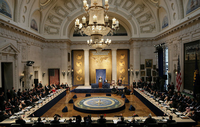As the founders of the United States wrote in the Declaration of Independence, an effectively governed state that keeps order and fosters the well-being of its citizens is an essential means of guaranteeing basic human rights and civil liberties. It is also something that the Palestinians have been denied for too long now. The world seems to have delegated the decision of whether and when the Palestinians will have their own state to Israel. But negotiations between the Palestinians and Israel were already unlikely to lead to a viable Palestinian state before the election of Benjamin Netanyahu as Israeli prime minister. Now it is no longer certain they will continue. Netanyahu's speech at a Likud central committee meeting in 2002 sums up his view of a Palestinian state: "Not today, not tomorrow, not ever." Although Netanyahu's stance has evolved little since then, it is time for the rest of the world, and especially the U.S., to adopt a new one. To retake the initiative, the U.S. must unilaterally recognize a Palestinian state now, with the expectation that its allies will almost certainly follow its lead -- and that Israel will at the very least acquiesce at first, and in all likelihood eventually follow suit.
Two States Now: The Case for Unilateral U.S. Recognition of Palestine

